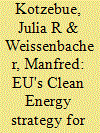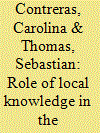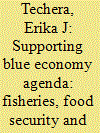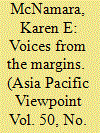| Srl | Item |
| 1 |
ID:
176703


|
|
|
|
|
| Summary/Abstract |
The European Union has more than 2200 inhabited islands. Many keep relying on fossil fuel-based energy systems, even though they are endowed with renewable energy resources (RES) and have access to gradually improving renewable energy technologies. In May 2017 the EU Commission and 14 member states with island territories signed the so-called “Valletta Declaration” in Malta's capital. The declaration states that islands can be favorable for innovative solutions and investments in local renewable energy production, given the abundance of various RES. However, the island nation of Malta features very low renewable energy shares within the EU. The Energy transition theory in the field of sustainable transition studies explains social and technological system-wide evolution and innovation, but only few scholars have focused on spatial governance in islands’ energy transition. Malta's urbanization rate is about 95%, which creates a spatially extreme situation. The policy perspective clarifies the role of spatial governance in Malta's energy transition from a fossil fuel-based to a non-fossil fuel-based country. A theoretical spatial governance framework guides the analysis. The perspective highlights that Malta's centralized and hierarchical spatial governance structure creates an environment, in which the spatial situation is used to argue against small and de-centralized renewable technologies.
|
|
|
|
|
|
|
|
|
|
|
|
|
|
|
|
| 2 |
ID:
167537


|
|
|
|
|
| Summary/Abstract |
There are more than 1500 partnerships and initiatives currently addressing Sustainable Development Goal #14 (Life Below Water), with blue carbon activities – carbon-oriented conservation and restoration projects in coastal ecosystems – representing a small proportion. A key challenge for blue carbon initiatives is the integration of social and cultural dimensions within governance mechanisms – a common problem in global environmental governance. An important question is how these mechanisms integrate local knowledge, traditional customs, and rights, especially in the climate-vulnerable contexts of island states in the Indo-Pacific region. This study describes global blue carbon governance – considering market-based instruments, public investment, partnership initiatives, and community-centred management schemes – and evaluates the extent to which these different approaches facilitate or constrain the integration and agency of local knowledge. This research offers valuable insights on the applicability of blue carbon governance mechanisms in small island states (SIS) in the Indo-Pacific region, and their potential to contribute to sustainability outcomes including social-ecological health and environmental justice.
|
|
|
|
|
|
|
|
|
|
|
|
|
|
|
|
| 3 |
ID:
158982


|
|
|
|
|
| Summary/Abstract |
The Indian Ocean region includes large ocean areas and a range of continental and island States with diverse legal systems, development status and political agendas. From a legal perspective, the challenges of regulating fisheries in such contexts are significant. Yet if blue economy goals are to be achieved – and food security, livelihoods and economies based on fishery resources assured – then sustainable management and utilization must be a priority. The imperative is clear when environmental degradation, the impacts of climate change and growing populations are taken into account. This article explores marine resource governance in the Indian Ocean, the legal landscape relevant to the management of fisheries, as well as selected national law and policy approaches. Thereafter recommendations are made for advancing law and policy to achieve blue economy goals, address pressures and ensure food security and livelihoods for future generations.
|
|
|
|
|
|
|
|
|
|
|
|
|
|
|
|
| 4 |
ID:
088001


|
|
|
|
|
| Publication |
2009.
|
| Summary/Abstract |
This paper captures some of the structural deficiencies within the United Nations' decision-making processes at its headquarters in New York. Ideas and methodological approaches from critical geopolitics are adopted here to examine semi-structured interviews held with Pacific ambassadors (n = 7) at the United Nations and bring new knowledge to an underexplored area. Results demonstrate that the institutional capacities of Pacific small island states hinder their ability to voice their concerns adequately at every United Nations' forum, while shifting imaginaries and a decline in popularity of issues has seen a drop in on-the-ground financial assistance for these states. In this way, this paper attempts to contribute to our understanding of the practice of international diplomacy within the United Nations.
|
|
|
|
|
|
|
|
|
|
|
|
|
|
|
|